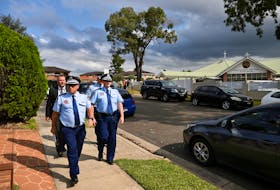Patients complaining of chronic pain or mental illness and a shift at the Aberdeen Hospital’s radiology unit are just a fraction of Michelle Johnson’s schedule this week.
A medical student at Dalhousie just wrapping up her first year, Johnson spent three days at the Westville Family Practice and one at the Aberdeen, as part of her school’s Rural Medicine Week program. She is working just up the road from her hometown of New Glasgow.
“It’s extremely important to have exposure to rural medicine, whether you end up in an academic, urban, or rural setting,” Johnson told The News on Friday.
All first-year med students at Dalhousie must spend a week shadowing a rural doctor in practice. The aim is to identify the key characteristics of clinical practice, health care delivery and resource access and use in a rural setting.
The Nova Scotia Health Authority says such experience is vital in the province, which is having trouble recruiting doctors to work in more remote communities.
However, rural medical training is also valuable for students working for doctors in bigger New Glasgow or Truro-area practices.
Johnson said that her hosting doctors and colleagues – known as preceptors – have been highly supportive of her.
Medical students shadow these physicians for their whole week. Hosting doctors offered students a realistic range of activities, including inpatient care at local hospitals, nursing homes and seeing patients in their offices.
They can also learn about what specialty medicine like anesthesia, radiology or internal medicine looks like in a rural area such as Pictou County.
“As students, we are so fortunate to have this experience and for those of us observing doctors in our home communities we are glad to have the opportunity to spend time working with the people who first fostered our interest in medicine,” said Johnson in an earlier release.
She told The News that working in a rural setting can sometimes be challenging, as there are fewer people to rely on when examining and treating patients.
This means taking on a greater range of responsibilities when caring for patients.
“Being creative in your practice is important,” said Johnson.
She was one of three medical students who worked in Pictou County from May 22 to 25. Two people including Johnson worked at the Westville Family Practice.
The NSHA says that one of the key indicators of where a physician chooses to practise is where they train. Programs like Rural Medicine Week aims to encourage new doctors to practise in communities that need their expertise.








